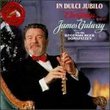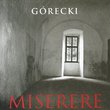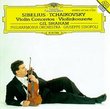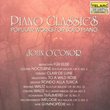| All Artists: Edvard Grieg, Robert Schumann, Frederic Chopin, Alceo Galliera, Herbert von Karajan, Philharmonia Orchestra of London, Dinu Lipatti Title: Dinu Lipatti Plays Grieg & Schumann Members Wishing: 0 Total Copies: 0 Label: Dutton Labs UK Release Date: 4/9/2002 Album Type: Import Genres: Dance & Electronic, Classical Styles: Chamber Music, Forms & Genres, Concertos, Historical Periods, Classical (c.1770-1830), Modern, 20th, & 21st Century, Instruments, Keyboard Number of Discs: 1 SwapaCD Credits: 1 UPC: 765387971922 |
Search - Edvard Grieg, Robert Schumann, Frederic Chopin :: Dinu Lipatti Plays Grieg & Schumann
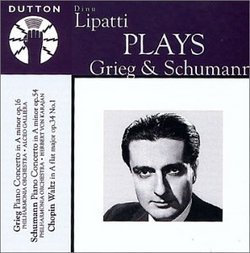 | Edvard Grieg, Robert Schumann, Frederic Chopin Dinu Lipatti Plays Grieg & Schumann Genres: Dance & Electronic, Classical
|
Larger Image |
CD DetailsSimilarly Requested CDs
|
CD ReviewsBetter Lipatti Is Found Elsewhere Jeffrey Lipscomb | Sacramento, CA United States | 05/11/2004 (3 out of 5 stars) "Dinu Lipatti and Clara Haskil were the greatest pianists that Romania ever produced. Lipatti was tragically cut down by leukemia in his early 30's and made only a handful of records. Unfortunately, neither of these particular performances show him at his best - and both are available elsewhere in somewhat better sound. Lipatti confided to his friends that he really chafed under the "classical" restrictions imposed by Karajan in this Schumann recording. His far better and more poetic live 1950 account with Ansermet was once available on London CD 425968-2, coupled with Haskil's lovely 1947 Beethoven 3rd with Carlo Zecchi and the London Philharmonic. Other accounts of the Schumann piano concerto that I cherish are the wonderfully rapt live account with Walter Gieseking and Furtwangler (now in a DG box set), the Benno Moiseiwitsch/Otto Ackermann/Philharmonia on Testament, the Yves Nat/Eugene Bigot account on Dante, Gulda/Andreae and the VPO on Decca, and Haskil's recording with Otterloo and the Hague Philharmonic on a Phillips CD. I am a great admirer of Sviatoslav Richter, but I think all of these are preferable to him in the concerto. Most of these CDs are sadly out of print - they are most definitely worth hunting down.I have never found Lipatti (or, for that matter, Solomon) all that magical in the Grieg piano concerto. In stereo I prefer Curzon/Fjelstad (coupled with the Gulda/Andreae Schumann on Decca). The live Michelangeli concert performance on BBC Legends (with de Burgos) is quite simply the most dazzling on disc - and I am generally not much of a Michelangeli fan.Bottom line: I would pass on this CD. There are simply too many superior alternatives worth hearing." AN IMMORTAL DAVID BRYSON | Glossop Derbyshire England | 09/07/2003 (5 out of 5 stars) "How many music-lovers aged under 50 have even heard of Lipatti, I wonder. He was Rumanian and lived from 1917 to 1950, continuing to give recitals when obviously at death's door from a combination of leukaemia and rheumatoid arthritis. It's a genuine tragic-romantic story but it needs no sentimentalising because this contemporary of Richter and Michelangeli easily stands comparison with either of them. It would be a rough but reasonable generalisation to say that he is the same kind of player as they are -- super-virtuoso but not in the 'exhibitionist' (said with no disrespect) tradition represented by Horowitz and continued by Cziffra, another contemporary. Lipatti was nearly as fastidious and perfectionistic as Michelangeli himself, and I urge any lover of great playing who does not know these performances or this performer to get hold of these accounts of the Grieg and Schumann at this modest price, however many others they already have. The Grieg is big, majestic and forceful, not unlike Michelangeli's version in a sense. For all it amounts to, the Grieg concerto has been luckier than it deserves in the interpreters it has found. Schumann's is another matter, a lovely and most loveable romantic masterpiece. In this Lipatti resembles nobody! The intermezzo has the beautiful lyric tenderness and smoothness that Lipatti was famous for, the central andante in the first movement is as full of affection and Innigkeit as I have ever heard, but the thing that makes the real impact in both the outer movements is the tremendous pace Lipatti takes them at. If that sounds wrong to you, all I can say is hear it for yourself. It's hard to put the effect into words, because no other version known to me is really similar and I doubt if there is a similar version anywhere. The opening chordal flourish will lift you out of your chair, the upward-rushing crescendo at the end of the exposition is stupendous (is this really the Schumann concerto we're talking about? Yes, and I bet Schumann would have loved it), and the finale, taken very fast, is a tumbling glory of great fingerwork, superb diablerie and enormous sensitivity at the same time, although I think I detect a creeping increase in tempo. Michelangeli is more 'mainstream', definitely slowish and I would say one for collectors rather than for anyone looking for a safe version. The Richter performance I have is the nearest to Lipatti's in overall approach, but the recorded quality is not all it might be. My general recommendation for a version that is both 'standard' in its approach yet full of personality and individual touches is by Serkin, but it may not be currently available. I also have a special affection for Backhaus's bucolic reading, though it may be even harder to locate by now. My own special favourite, and also in the Grieg, is by Cherkassky, cool and reflective, exquisite in the central andante of the first movement and with wonderful crystalline fingerwork, but also difficult to find these days. But when all is said and done, look at the price of this Lipatti disc. Treat yourself." I Love Dinu Lipatti and Dutton, but... Michael B. Richman | Portland, Maine USA | 06/13/2003 (3 out of 5 stars) "Don't get this CD! The reason is that the exact same recording of the Grieg Concereto is available on an EMI References CD that couples it with Chopin's Piano Concerto No. 1 (Otto Ackermann/Tonhalle-Orchester Zurich). Furthermore, the very same Schumann Concerto is available on an EMI "Great Recordings of the Century" disc that also features Mozart's 21st Piano Concerto (Karajan/Lucerne Festival Orchestra). Lipatti is so good, and his recordings so scarce, that anyone interested in him should not settle on purchasing just two concertos when for a little more money they can get four. I am surprised that Dutton released this, they are usually so good about licensing and issuing unique historical recordings. I hope Dutton doesn't turn into another Classica D'Oro -- with them you have to really pay attention in order not to buy redundant product!"
|

 Track Listings (7) - Disc #1
Track Listings (7) - Disc #1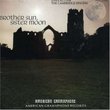

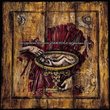


![Across The Universe [Deluxe Edition]](https://nationalbookswap.com/cd//m/51/1251/1241251.jpg)
